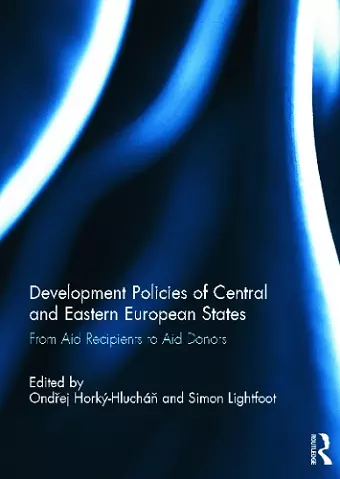Development Policies of Central and Eastern European States
From Aid Recipients to Aid Donors
Simon Lightfoot editor Ondřej Horký-Hlucháň editor
Format:Hardback
Publisher:Taylor & Francis Ltd
Published:6th Dec '12
Currently unavailable, and unfortunately no date known when it will be back
This hardback is available in another edition too:
- Paperback£28.99(9781138945104)

The states from Central and Eastern Europe that joined the EU in 2004 and 2007 provide a fascinating series of case studies for scholars interested in politics, IR and development studies. The interest comes from the fact that never before had so many recipients of EU aid joined the Union and taken on the commitment to become aid donors. The journey from recipients of aid to aid donors is interesting because, not only does it tell us about development policy in CEE states, this policy area gives us an insight into governmental structures in CEE states, foreign policy priorities, public opinion, the role of NGOs/civil society and how well CEE states have taken on board the EU acquis (the EU’s rule book). The book also explores whether the development cooperation programmes of the majority of CEESs reflect the so-called "transition experience" of moving from authoritarianism and socialism to democracy and modern liberalism. It also explores the extent to which these donors are aligned with the approaches of the DAC donors. Finally, by extending the scrutiny to the bottom-up development activities of non-state actors and public opinion, the book will analyse the dynamics of the solidarity of the former ‘East’ with the global ‘South’.
This book was published as a special issue of Perspectives on European Politics and Society
Fewer and fewer donor country studies have been published in recent years. In particular, the aid policies of the New Member States have been in the shadows for a long time. This volume is not only timely but also plays the important role of demystifying some of the central roles which were conferred to the development assistance programmes of these emerging donors.
Prof. dr. Paul Hoebink, Director Centre for International Development Issues Nijmegen, Radboud University Nijmegen, The Netherlands
This volume provides a clear and sophisticated analysis of actors, processes, and policies of the new (or re-emerging) donors in Central and East Europe. It draws on a number of different theoretical approaches, provides new empirical material, and challenges existing assumptions. By doing so, not only does it fill a gap in the academic literature, but is set to become an essential reading for all those who want to have a better understanding of the new global aid architecture.
Maurizio Carbone, Professor of International Development and Jean Monnet Professor of EU External Relations Director of PhD Programme in Politics, School of Social and Political Sciences, University of Glasgow, Scotland.
ISBN: 9780415639125
Dimensions: unknown
Weight: 430g
136 pages